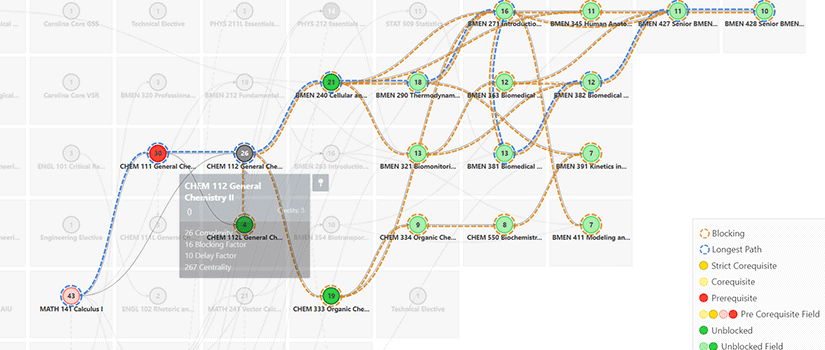Curricular Analytics Defined
Curricular Analytics assesses the structural complexity of an academic program/major/degree (not instructional complexity). Curricular Analytics identifies courses in a curriculum that may delay a student due to preventing them from moving on in a sequence of courses that leads to graduation. Curricular complexity is inversely related to program quality and student success.
The simplest curriculum (in terms of complexity) that allows students to attain a program's learning outcomes yields the best student success outcomes and therefore the highest quality program.
- Heileman et. al (2019), Does Curricular Complexity Imply Program Quality
Watch the video below for an explanation of curricular analytics by creator Greg Heileman.
Understanding Curricular Analytics
In the analytics tool, each course has a blocking factor, a delay factor, a measure of centrality, and a complexity score.
- Blocking Factor: the number of courses a student is prevented from taking until the gateway course is successfully completed.
- Delay Factor: the longest chain of courses connected as requisites.
- Centrality: requires various prerequisites and is also a prerequisite for many additional courses in the curriculum.
- Complexity Score: sum of blocking factor and delay factor
The Curricular Analytics tool was created at the University of New Mexico and developed by Greg Heileman, Vice Provost of Undergraduate Education at the University of Arizona, and Chaouki Abdallah, Executive Vice President for Research at the Georgia Institute of Technology. The Curricular Analytics tool does not take into account course availability, course restrictions, and/or advising practices. Those are additional issues that affect the complexity of a program. Structural complexity also does not indicate quality or rigor of a program. However, the Curricular Analytics Tool can be used to identify bottlenecks and key courses in curriculum is a way to compare program requirements and structural complexity with peer institutions.
Why is Curricular Analytics Important?
- Visualize the path to a degree.
- Allows us to view complexity within our institution and across institutions.
- All students must have an accurate degree audit and curricular design impacts student ability to view progress toward degree.
- The higher the complexity score, the harder it is for students to graduate on time.
- Simplifying the path to a degree has financial and academic value for students.
- Clear degree pathways lead to student success.
What Now?
Best Practices for Reducing Curricular Complexity
- Use prerequisites only for content that builds on previous course content and not as enrollment management.
- Courses only appear once in the program of study.
- Provide lists of course options for requirements that allow for student selection.
- Remove conditional practices and replace with prescribed requirements.
Curriculum Management
Curriculum Management is the oversight involved in maintaining accurate, clear, consistent, and cohesive curricular information with the purpose of increasing student success and enhancing the academic advising experience.
Foundation Statement for Curriculum Management
Transparent degree requirements create universal understanding and consistency in advising and across curricular sources, promote a culture of student responsibility, and support University initiatives for curricular cohesion.
Explore Additional Curricular Analytics Resources
Boyer 2030 Report on Undergraduate Education at Research Universities [pdf]
Is your Degree Program Too Complicated? Poor design and needless bloat are derailing students (Chronicle of Higher Education)
How Reducing Curricular Complexity Can Help Boost Graduation Rates (Association of Public & Land-Grant Universities)
Does Curricular Complexity imply program quality?
(Heileman, G.L., Thompson-Arjona, W.G., Abar, O., and Free, H.W. (2019). Does curricular complexity imply program quality? 126th Annual Conference & Exposition, American Society for Engineering Education. http://doi.org/10.18260/1-2--32677
Heileman, G.L., Abdallah, C.T., Slim, A., and Hickman, M. (2018). Curricular analytics: A framework for quantifying the impact of curricular reforms and pedagogical innovations. https://doi.org/10.48550/arXiv.1811.09676)
